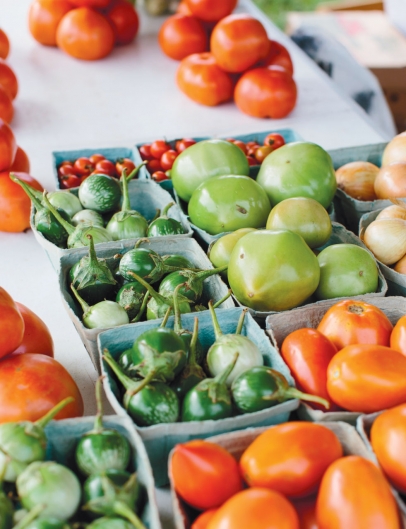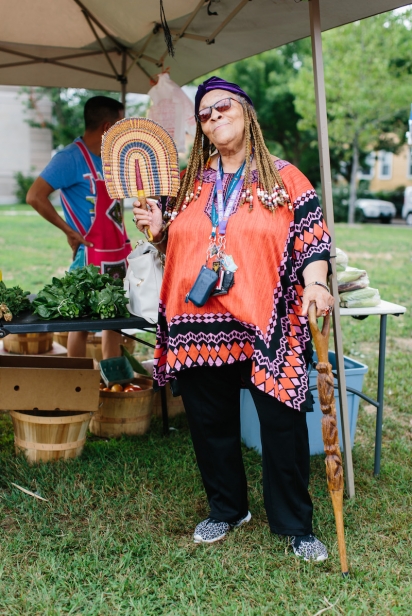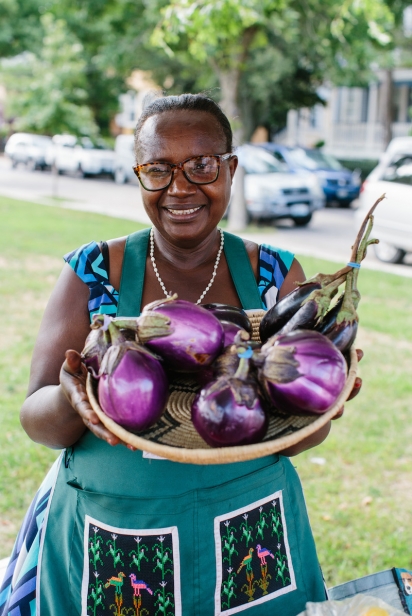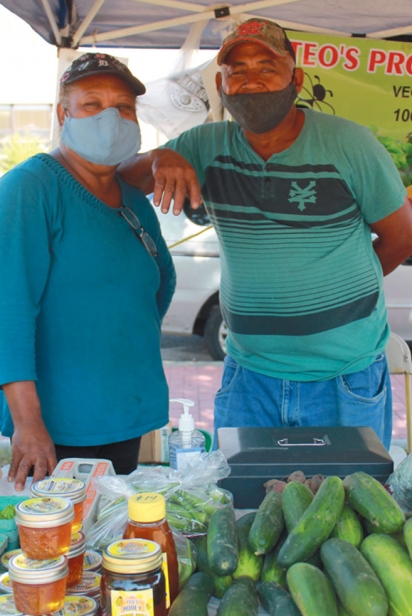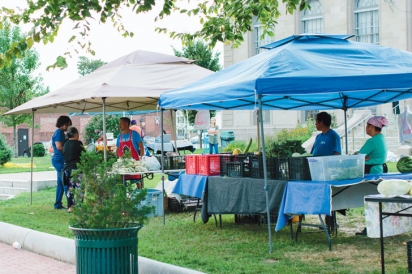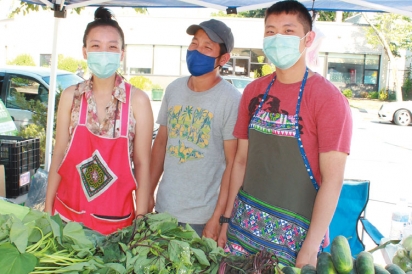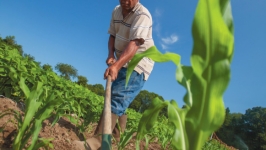The Sankofa Initiative
Building Strength in Community Through Gardening, Cooking and Trade
Mathematicians say triangles are the strongest shape— their power coming from the ability to share the weight of a load evenly on all sides. Such is the strength of the West Elmwood Housing Development Corporation’s Sankofa Initiative, a trio of food and urban agriculture programs: a farmers market, community garden and commercial kitchen. At the center of the triangle is housing, health and food access for Providence’s West End community.
Starting in 2011, the legs of the Sankofa triangle were built slowly and deliberately over time, each program complementing the next. West Elmwood residents and nearby community members grow food for themselves and others in the gardens and market-growing plots; market vendors sell to neighbors and the community kitchen’s small food businesses; those in turn sell their prepared foods and valued-added products at the market and other places around the city and region.
Sankofa, a word from the Twi language of Ghana, operates in one of the most culturally diverse neighborhoods in Rhode Island, where the majority of participants are first-or second-generation immigrants from all over the world. “The word Sankofa means ‘go back and get it,’” explains Julius Searight, manager of the market that runs every Wednesday from 2–6 pm on the lawn of the historic Knight Memorial Library on Elmwood Avenue. “So go back and learn what your ancestors taught your family, what your family traditions say, and bring it and share it.”
THAT WAS THEN
This mission is clearly reflected in the varieties of fresh produce on display in the 10 or so tents flapping in the breeze at the market each week—vegetables, herbs and products from Hmong, West African and Central American traditions are front and center.
“The corn isn’t super sweet, but the texture is sticky and it tastes buttery. It’s best for steaming or boiling,” says vendor Leng Fang of his white, waxy corn on a bright early September day in 2019.
Most tables I visit feature fresh kittely, small African eggplants about the size of cherry tomatoes that range in color from neon greens to oranges to reds; bitter balls, a slightly larger variety of eggplant known for its acrid aftertaste; and sweet potato greens, a nutrient-packed substitute for spinach often used for stews and soups.
“I come for the fresh, organic vegetables—at a good price. I buy and give them to the older people in my building, Dominica Manor, in Federal Hill,” says Margaret Kehyeiah, a gregarious octogenarian who likes to tell the story of how her one-of-a-kind cane was once rescued by a squad of Providence police officers on bicycles after being stolen from her. “I buy the greens because they need little to no cooking; you don’t have to do a lot with them. A lot of people can’t cook because they’re sick, so we fix food and desserts and give it out. They like the collard greens and bitter ball gravy.”
Across the market, Margarita and Teodulio Martinez of Teo’s Farm chat with the customer base they’ve grown over the past six years here at Sankofa. “We started here; that makes it special,” Margarita tells me. “We’ve met a lot of customers here and they keep telling other people to come and buy from us.” They also have something nobody else does: honey from the hives Teo keeps behind their South Providence home.
Even the crafters at the market like Kathleen Stack and her venture Shibó RI emphasize cultural preservation. Stack’s tie-dyed apparel is created with the Japanese shibori technique.
THIS IS NOW
A year later, I return to the Sankofa market to see what changes the pandemic has brought. It’s an oven-hot afternoon in mid-August; despite a portable handwashing station, everyone masked up and the lack of live music (in past years produced in partnership with the Southside Cultural Center), things look and feel about the same.
Maria Cruz, a neighbor and shopper, puts it best: “Todo es igual porque todo el mundo se protegen” (“Everything is the same because everybody is protecting themselves.”)
One change is that of leadership. While Searight still manages the market, a month ago Melanie Borges took the reins of the entire Sankofa Initiative from Dominique Resendes, who transitioned to a different role concentrating on health equity within the West Elmwood footprint.
Of Sankofa’s role crawling through the many chasms of Covid-19 and racial injustice, Borges repeats an oft-heard refrain: “It’s put the spotlight on things we knew existed, and turned the dial up tenfold. Losing jobs, caring for family members, not being able to socially distance because there are too many people in the house—these are realities for a lot of the families that we work with.”
In our conversation a year ago, Resendes raised several food policy changes she thinks would positively impact the community Sankofa serves—changes that feel even more imperative now. She estimated that 70–80% of the Sankofa market customers receive some kind of food assistance, whether SNAP, EBT or WIC. And over the years she’s observed how bustling the market is at the beginning of the month when those programs reauthorize, and how empty it can be during the last week of month—clearly demonstrating a greater need. “It shows that people aren’t getting enough SNAP, and our market data clearly reflects that. There’s a really significant drop in the last week of the month.”
Another area of focus for Resendes is the accessibility for navigating food business start-ups. Before the pandemic, Sankofa had been working on an incubator program similar to that of Hope & Main, but with an additional layer of cultural competency and transcending language barriers. “Our vendors are such good cooks; they make amazing products, but there are so many financial and language barriers to creating prepared and value-added products in this system,” says Resendes.
With so many people out of work due to Covid-19, it makes sense to reduce the hurdles for aspiring entrepreneurs—especially those growing and producing local food products. “We’re looking at how the cottage laws in Rhode Island can be changed to better support small businesses,” Resendes continues. “For instance, we have one resident who makes chocolate and candies—does she really need to be in a commercial kitchen that charges $30 per hour? We absolutely need to make sure products stay safe, but also be realistic about the risk that goes into, say, a baked good or a chocolate—something that doesn’t have dairy, eggs or meat. There needs to be accessibility and more opportunities for entrepreneurship within these communities.”
For now, the three legs of the Sankofa triangle continue to strengthen and hold each other up. Its community kitchen members Kraev, Distinguished Catering, Talkin’ Tummy 401 and Dips Dips PVD are all doing limited takeout and pop-ups, the community gardens are in full abundance and the market vendors are supplying their customers with the affordable and familiar foods they need.
“Our vendors all have such interesting stories to tell,” says Resendes. People should come not only to shop, but also to get to know the folks who are selling the food. You’ll really learn a lot.”
Sankofa Market
(accepting SNAP, Bonus Bucks & EBT)
Knight Memorial Library
275 Elmwood Ave., Providence
W, 2–6 pm • June 24 to Oct 28
For more information on the Sankofa Initiative, market updates and a list of community kitchen vendors, visit WestElmwoodHDC.org/sankofa-initiative/


